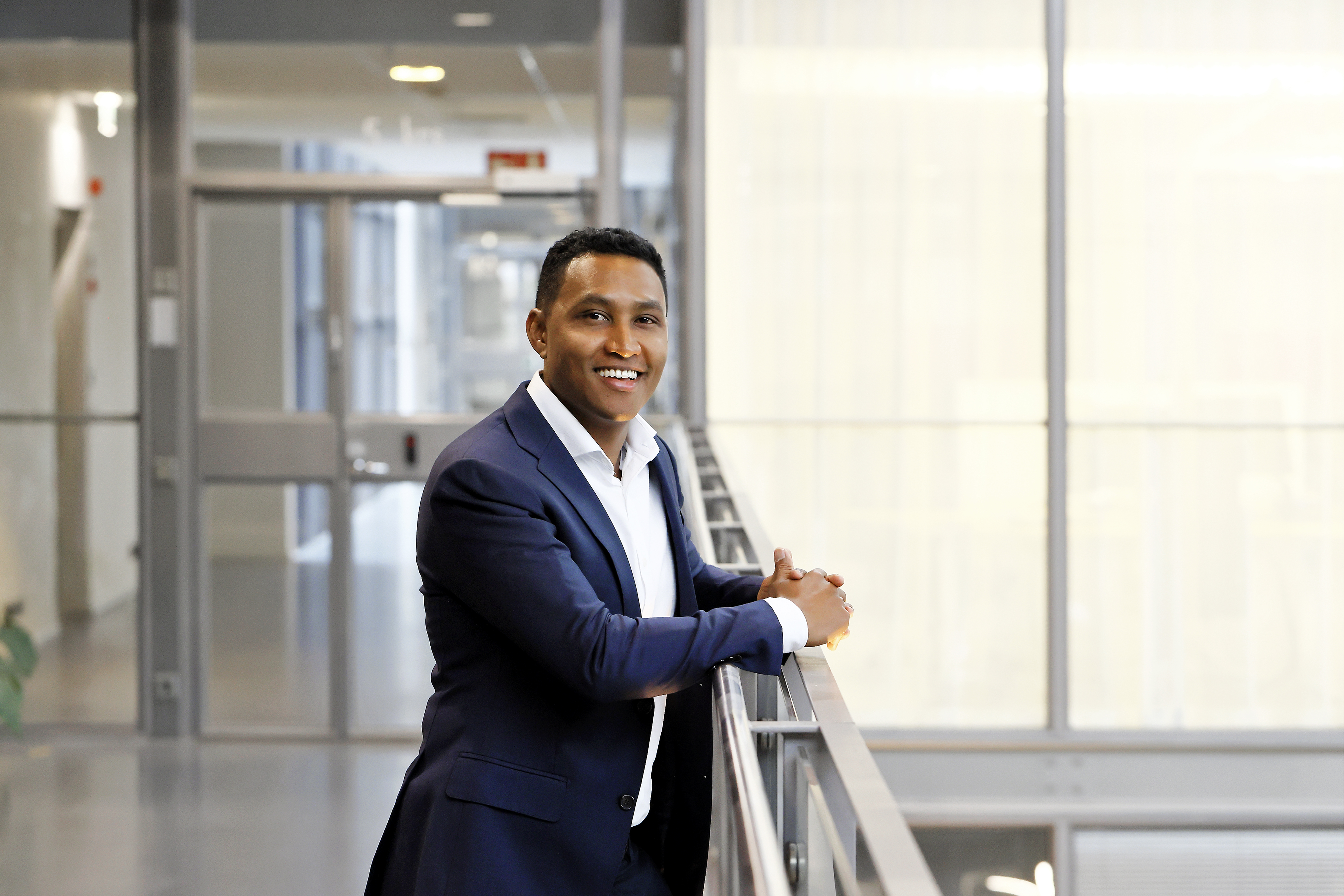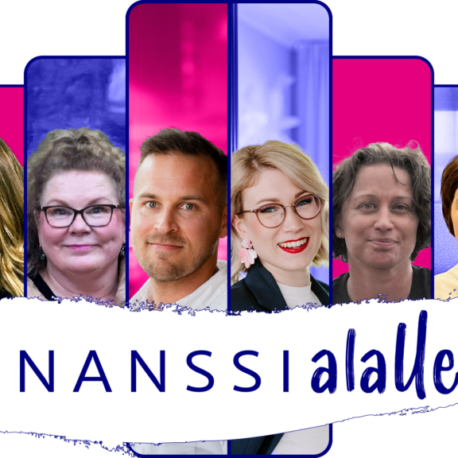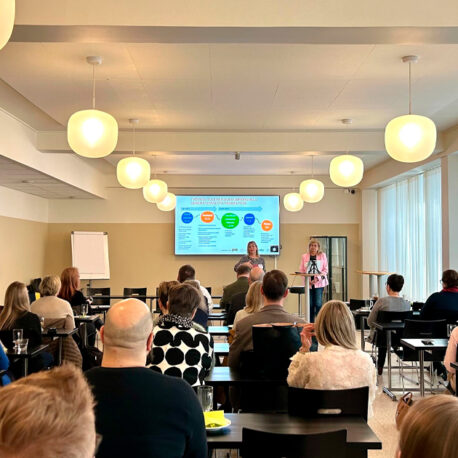
Ilmarisen vastuullisen sijoittamisen asiantuntijan Gerald Esonon uratarina on osa FinanssiTYÖ2030-hankkeessa julkaistavia uratarinoita. Gerald avaa uratarinaansa ja kertoo, millaista on työskennellä kansainvälisenä osaajana Suomessa. Uratarina on alun perin julkaistu Finanssiala ry:n englanninkielisillä sivuilla.
Gerald Esono is a responsible investment specialist at Ilmarinen Mutual Pension Insurance Company. He is part of a team that supports Ilmarinen’s active ownership activities and the integration of sustainability risks in investment analyses and decisions. Gerald’s focus in the team is on the integration of ESG (environmental, social and corporate governance) data and the development of research and analytics to support the continuing advancement of Ilmarinen’s responsible investment policies. His dearest responsibilities, however, lie outside of working life, where he is a supportive husband and a father to an energetic 3-year-old daughter.
Gerald Esono was born in Madrid to an Equatorial Guinean and Filipino household. The family moved to Nairobi, Kenya, when Gerald was still a child, and he grew up half in Nairobi and half in Arusha, Tanzania. In his late teens, Gerald decided to return to Europe for university studies. After weighing Spain and the UK as alternatives, he decided to move to the UK because he had always loved to experience new cultures. Gerald had an interest in the social sciences, finance and geography, and he completed a bachelor’s degree in Economics in Canterbury. He then continued with two master’s degrees: first in Business Economics at the City University of London and second in Environment and Development at the London School of Economics.
Gerald started his career in financial data and analytics in the City of London, feeling that the mixture of technology and capital markets made a good entry point to the financial services sector. In London he met his Finnish wife. They visited Finland quite a few times on holidays, and Gerald grew quite fond of the country, especially its nature. In 2017, he and his wife decided to move to Finland.
Being part of the Finnish working community as an international expert
When Gerald moved to Finland, his career development first slowed down as he had to adapt to Finnish life in general. According to Gerald the most basic thing that settling into a new country requires is getting familiar with the language and culture. For the first 12 months he focused on doing Finnish language classes with the help of TE Services, the employment and economic development office of Finland. All the while, along his journey in adapting to Finland, he was actively networking and learning about working life and the Finnish business culture. Due to his interdisciplinary work experiences, he could focus on specific areas he wanted to develop his career in, one being the inclusion of ESG factors as part of the process of integrating the assessment of material financial risks and growth opportunities in investment analysis. This was something he already had some experience of from his time working in London.
Gradually adapting to Finnish life and being persistent with finding relevant work opportunities, Gerald started to work for a company whose main working language was Finnish. This was a big challenge, but he had the support of his colleagues. His current employer Ilmarinen has also been supportive of his integration in the working community, providing him an environment where he can work to the best of his abilities and facilitating different ways of contributing ideas and feedback. For example, Gerald can do Finnish classes during working hours, which really supports his Finnish language learning and eases the pressure of continuous learning outside working hours.
A lot of the internal communication is in Finnish also at Ilmarinen, but Gerald tries his best to continuously learn more – not only from a language perspective but also in terms of how the company conducts its business as a whole. The 12-month language program provided him with a good foundation for his ongoing language development, and Gerald is now working to apply his language skills in the work environment by reading or listening to company presentations, for example. His colleagues are accommodative and switch to English if he is present in meetings where feedback and discussions are required. Any important regulatory obligations that he receives are in English.
Working culture in Finland
If we look at the differences of the Finnish work community, work, and managerial work in relation to other countries, the one thing that really stands out is the lack of hierarchical structure, says Gerald. He feels that there is always the opportunity to talk with other colleagues irrespective of their positions. He also likes the fact that people can be, depending on the context and project, quite direct and to the point. Moreover, he is always struck by how considerate working life in Finland is when it comes to being able to achieve a good work-life balance. There are certainly days where one must work longer than usual due to crucial deadlines, but on the whole, the idea of using your time wisely and being considerate of other people’s time is something Gerald really appreciates about working in Finland.
In terms of weaknesses, Gerald has noticed that there is the tendency to stick to doing things the way they have always been done before. Perhaps an outside perspective could shake things up a bit?
Finland needs more experts from abroad, so we asked Gerald what he sees as important factors when international experts consider coming to work in Finland. Once Gerald knew he would be moving to Finland, he had to acknowledge the fact that there would be some sort of cultural adaptation phase to go through. This would be presented in many ways, such as making new friends, learning the language and getting familiar with the Finnish culture. Reflecting on this in advance helped him frame certain expectations of applying to a certain job position in Finland.
Secondly, he had to be open-minded and ready to take up any sort of opportunity to either learn something new or meet different people. This led him to take a semi-formal educational journey, and it was during this time that he made sure to try and network and meet people from all walks of life, from startups to NGOs to established companies.
Thirdly, he knew that the Finnish economy is highly specialised and that there are regional factors at play, depending on the company’s own unique characteristics in terms of market size and how certain social and business activities are conducted. Therefore, it is important for any international experts considering working in Finland to research and identify certain niche areas of business activities where they could provide their own specialized insights and lived experiences.
On a very practical level, Gerald thinks Finnish companies, especially if they are small to medium-sized enterprises or region-centric, should work on creating and developing collaborative ecosystems that would encourage and invite international talent or backgrounds from all walks of life to participate. This would also add value to the companies in the form of fresh ideas, both on a practical and cultural level.
Diversity in Finnish workplaces
Despite the low hierarchy and emphasis on wellbeing at Finnish workplaces, Finland still has a bit to learn when it comes to improving diversity. According to Gerald, the integration of diversity in Finnish workplaces should be treated more as a continuous learning process between the employer and employee, while still considering the time-bound aspects and complex relationships between society, the economy and government policy. Iterating best practices and identifying areas of improvement from a company perspective and taking gradual steps towards investing in the potential of new hires, where language is not the only crucial factor, could open up different approaches on how to create innovative and sustainable business practices here in Finland.
The debate about integrating international talent (as well as talent from all walks of Finnish society) is continuously gaining momentum in Finland, which Gerald considers a good thing. To sum up his views, Gerald offers an analogy: most of the most resilient natural ecosystems thrive because of their highly diverse characteristics and ability to learn from their surrounding environment. This same logic can be expected to apply not only in the cultural ecosystem of working life but also in society at large.
Jäikö kysyttävää?
|Ota yhteyttä aiheen asiantuntijaan
Janoatko lisää?
Tähän aiheeseen liittyviä uutisia ja kolumneja

Mitä tekee data-analyytikko? Miten opiskella vakuutustutkijaksi? – Uudet finanssialalle.fi -sivut esittelevät finanssialan työtehtäviä ja opiskelumahdollisuuksia

Generatiivisen tekoälyn nopea kehitys yhdistää entistä vahvemmin finanssialan toimijat sekä alan opetusta tarjoavat oppilaitokset

Matka generatiivisen tekoälyn parissa on vasta alussa – tervetuloa webinaariin 3.6.2024

Generatiivinen tekoäly mullistaa työelämää sekä vaatii aivan uudenlaista osaamista




